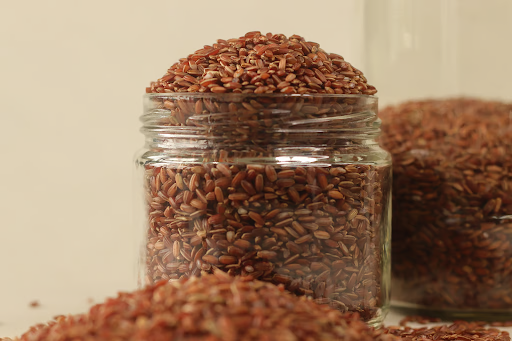For more intellectual property updates, follow our WHATSAPP CHANNEL and SUNS LEGAL | LinkedIn
Written by Maria Therese Syriac, Legal intern, and verified by Sunil Jose, Managing Attorney, Suns Legal.
Navara rice, endemic to the Palakkad district of Kerala, has been cultivated for over 2,000 years. This deep red rice, often called “gold” for its rich nutritional and medicinal properties, holds both cultural and religious importance, even being used in temple ceremonies. Despite its long-standing presence, the variety is on the brink of extinction due to factors such as hybridization, lack of pure seeds, high production costs, and declining yields. In 2007, Navara rice was granted Geographical Indication (GI) status, recognizing its unique identity and link to Kerala. The Registry aims to protect the unique attributes of these rice and prevent the unauthorized usage of the Navara rice. The World Intellectual Property Organisation (WIPO) defines GI as a sign used on products with a specific geographical origin and possess qualities or a reputation due to that origin.
The Case
The controversy emerged when P. Narayanan Unni, a farmer from Palakkad and founder of the Navara Eco Farm, filed a petition under the Protection of Plant Varieties and Farmers’ Rights Act, 2001 (PPV&FR Act) to register two variants of Navara rice. Unni’s petition claims exclusivity over specific variants cultivated in his farm, asserting these are distinct and localized to the Chittur area. This move has sparked opposition from the Kerala Agricultural University (KAU) and other stakeholders, who argue that such registration would undermine centuries of collective agricultural heritage.
Legal Issues
The primary contention centers on two fundamental questions.
First, can an individual claim exclusive rights over a traditional variety that has been collectively preserved and cultivated by farming communities for generations? Second, how does the PPV&FR Act’s registration system interact with existing protections like Geographical Indication (GI) tags?
The case particularly shows the tension between two legal frameworks: the GI registration, which Navara rice received in 2007 recognizing it as Kerala’s collective heritage, and the PPV&FR Act, which allows individuals to register unique plant varieties under their names.
Arguments for Registration
Unni in his petition argued that his variants of Navara rice are distinct and have been specifically developed in his farm’s ecological conditions. The petition states that these variants possess unique characteristics that differentiate them from the general Navara variety.
Supporting this position is the PPV&FR Act’s provision for protecting farmers’ varieties, which aims to reward innovation and conservation efforts by individual farmers. Unni’s application aligns with the Act’s objective of encouraging farmers to preserve and improve traditional varieties. He also stated that he does not wish to deprive any other farmers or government from using these.
Opposition’s Stance
The Kerala Agricultural University, leading the opposition, presents several compelling arguments. First, they contend that Navara rice, with its 2,000-year history, represents shared cultural and agricultural heritage that cannot be reduced to individual ownership. KAU emphasizes that the variety’s GI tag already acknowledges its collective nature.
More critically, KAU argues that allowing individual registration could create a dangerous precedent, potentially leading to monopolization of traditional varieties. They highlight that such registration could restrict other farmers’ rights to cultivate and market Navara rice, contradicting the very purpose of the GI protection.
The opposition also raises procedural concerns, particularly regarding KAU’s exclusion from the final hearing despite being a primary technical authority on Kerala’s agricultural heritage.
Analysis
The case requires careful examination of Navara rice’s characteristics and its various traditional forms. The deep red rice variety, often called “gold” for its nutritional and medicinal properties, faces extinction due to various challenges including hybridization and declining yields.
Experts emphasize that traditional varieties often exist in multiple forms across different micro-climates, making it problematic to grant exclusive rights to any single variant. This diversity is crucial for the variety’s resilience and adaptation to different growing conditions.
The case exposes fundamental gaps in India’s plant variety protection system. Under Sections 8(1) and 8(2)(c) of the PPV&FR Act, the Authority is mandated to document and catalog farmers’ varieties. However, the absence of a database of traditional varieties complicates the verification of uniqueness claims.
The controversy also points to the potential conflict between different forms of intellectual property protection – geographical indications and plant variety registration – raising questions about their hierarchical relationship in protecting traditional agricultural knowledge.
Impact and Implications
The Navara rice controversy represents more than a simple registration dispute. The case’s outcome could set important precedents for how India looks at individual farmers’ rights with collective traditional knowledge.
The controversy also indicates the urgent need for documentation of traditional varieties and clear guidelines for managing overlapping protection systems. This case might catalyze reforms in how traditional agricultural knowledge is protected and preserved in India.
Whatever the outcome, the Navara rice controversy indicates the need for approaches to protecting traditional agricultural knowledge in an era of increasing commercialization and individual rights.

